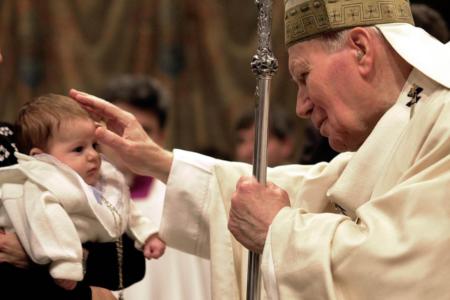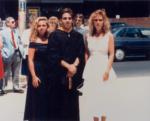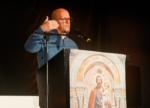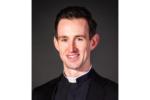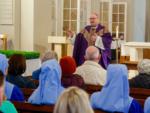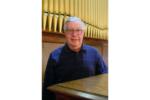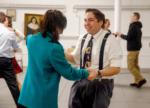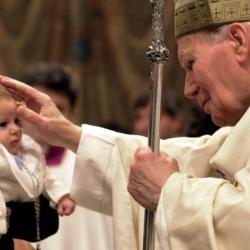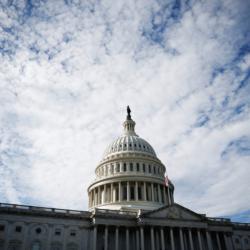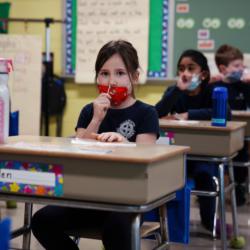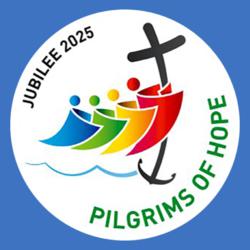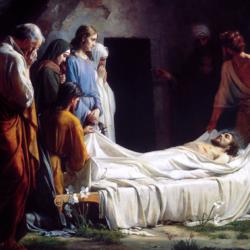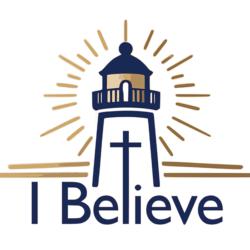Local Black Catholics participate in national congress
NATIONAL HARBOR -- "Writing the Vision: The Prophetic Call to Holiness" was the theme of this year's National Black Catholic Congress, which took place July 20-23 at the Gaylord National Resort and Conference Center in National Harbor, Maryland.
The National Black Catholic Congress was first convened in 1889, but the annual gathering ceased after 1894. It was revived in 1987 and has taken place every five years since.
Joyce Harvey and Ruth Villard, both parishioners of St. Katharine Drexel in Dorchester, were among the approximately 3,000 people who attended the congress this year.
Villard had just returned from the Knights and Ladies of St. Peter Claver conference in New Orleans. She has attended all but one of the congresses since they resumed in the 1980s, and she deemed this year's "one of the best." She praised the amount of information given out as well as the beautiful music and spiritual dimension of the event.
"It was wonderful. I felt like I was floating on air, I was so hyped up with the Holy Spirit," she said.
Harvey, who is a member of the NAACP, said that as a Black Catholic in Boston, where they "seem to be few and far between," one of the "heartening" things about attending the congress is seeing so many other Black Catholics from across the country.
"I feel oftentimes that I'm not getting as much attention as I might want or as I might need, whereas the congress is organized (by) and directed toward us. The breakout sessions, conversations, activities, are often focused on things that Black Catholics may want and/or enjoy. I love that about it," Harvey said.
Not all the participants were Black, however: some clergy and parish leaders of other ethnicities also attended to learn how they could support Black Catholics in the communities they serve.
"It's nice to feel like people want to know more about us and how they can best help us," Harvey said.
Cardinal Seán P. O'Malley attended the congress and had lunch with the Boston-area participants on July 22. When they met with him, Harvey passed on what she had heard in one of the presentations about the role of the laity, that it is important for priests and pastors to visit and learn about the culture of Black Catholics.
"We're not just white people with darker complexions. We bring with us, as Thea Bowman said, our whole selves. We have a culture and a history and an ethnicity and a background, and so much behind us that is so rich," Harvey said.
She added, "Our music is different. Maybe the way we dance or want to be involved in liturgy is different. And it's important that the priests and the pastors and any other supportive staff understand that. We're not just darker-skinned white people. We are people with a whole frame of mind, attitude, culture of our own that we bring."
The four-day congress included times for liturgy as well as workshops and presentations on various topics. Priests offered opportunities for the Sacrament of Reconciliation, and representatives of different groups -- including Boston College -- set up tables in an exhibition hall.
One of the presenters was Lorna DesRoses, the Archdiocese of Boston's evangelization consultant for ethnic communities and coordinator of Black Catholic ministries.
Speaking to The Pilot on July 28, DesRoses explained that one component of the congress is putting together a pastoral plan reflecting the concerns of Black Catholics, which is meant to serve as a resource for dioceses across the U.S. This year, this was done by having the participants fill out a survey.
Another aspect of the congress, DesRoses noted, is the opportunity to reunite with people they know, or meet new people, who work in similar areas of ministry.
"It's always good to hear other people's perspectives in regard to the ministry they're doing and how that ministry is bearing fruit," DesRoses said.
The congress began with an opening Mass on July 20 at the Basilica of the National Shrine of the Immaculate Conception, celebrated by Cardinal Wilton Gregory of the Archdiocese of Washington. That night, there was a reception at the Smithsonian's National Museum for African American History and Culture.
In his homily, Cardinal Gregory talked about the six Black Americans who are being considered for beatification or canonization: Ven. Henriette DeLille, Ven. Father Augustus Tolton, Servant of God Mother Mary Lange, Sister Thea Bowman, Ven. Pierre Toussaint, and Servant of God Julia Greeley.
"They did incredible things despite incredible difficulties. And they did not allow these things to hinder their faith in God or what they felt they were called to do by God," DesRoses said.
She said they could be thought of as "ordinary people being called by God to do extraordinary things."
"By extension, we're all being called, by virtue of our baptism, to serve. I think it's just a matter of discerning what God is asking us to do," she said.
DesRoses, who is legally blind from congenital cataracts, gave a presentation at the congress about the experience of Black Catholics with disabilities, emphasizing that they, too, are called by Christ to evangelize.
She encouraged studying what the Church teaches about disabilities, because there are "many beautiful documents" on the subject that are not well-known. She also encouraged telling and listening to stories about living with disabilities.
"When we look at who we are within the Church, I think there is an opportunity for us to bear witness to Christ and share our experience as persons with disabilities. We know that Christ, during his suffering, understands and knows the pain," DesRoses said.
She said she hopes the topic will be "a continuing conversation."
Other workshops covered such topics as evangelization, liturgy, cross-cultural ministry, social justice, healthcare, and mental health.
Prior to the start of the congress, there was a pre-conference workshop from the Dismas House of Indiana called the Reentry Simulation, which simulated the struggles faced by people transitioning from incarceration back into society.
On July 22, there was a Eucharistic liturgy for the feast of St. Mary Magdalene. There was also a premiere screening of a new documentary, "Answering the Call to Thrive: The Legacy of the National Black Catholic Congress."
Those attending the congress also had the opportunity to help with the "No Child Hungry" service project, packing meals for people in Haiti through My Neighbor's Children.
"We did a community service as well, and I was so overjoyed that so many people took part in that," Villard said.
At the closing Mass on July 23, Bishop Roy Campbell, the president of the Black Catholic Congress, called anyone considering a vocation to the priesthood or religious life to come forward. About 10 people did so, and the assembly prayed for them together.
The homilist for the closing Mass was Bishop John Ricard, who is the superior general of his religious order, the Josephites. He used to be an auxiliary bishop in Baltimore, and he was instrumental in restarting the National Black Catholic Congress in 1987.
Bishop Ricard exhorted those who attended the congress, "Don't let the fire go out!"
Villard said they now need to share what they learned at the conference with their communities, to "explain to the parishioners and the pastors what we have seen and what we have heard."
"We have to go out and spread the Good News we have heard, so we can write our vision for the Archdiocese of Boston," Villard said.
